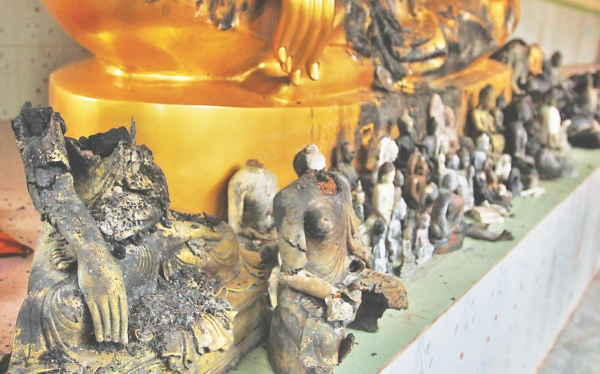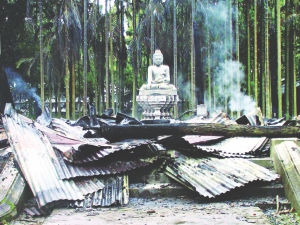| Home - Back Issues - The Team - Contact Us |
 |
| Volume 11 |Issue 39| October 05, 2012 | |
|
|
Perspective
A Question of Identity Sushmita S Preetha It bewilders me, frustrates me, saddens me, but more than anything, it angers me. How can it be that in a state that claims to be secular, our minorities are subjected to such atrocious and malicious acts of violence? Only a few days ago, violence erupted in Rangamati and nearby areas after a clash between a Bengali and indigenous student of Rangamati Government College. Systematic attacks were carried out on the already-oppressed indigenous population of the region, in plain view of members of law enforcement agencies. Even before the flames of that fire could die down, thousands of rioters attacked the Buddhist population in Cox's Bazar, torching and looting Buddhist temples, innumerable homes and hundreds of years of history in what is now considered one of the worst cases of communal violence in the country. The protesters gathered, apparently, to protest a derogatory image of the Quran on Facebook posted by a Buddhist youth. It was later found that he had been tagged in the picture by a group called “Insult Islam” and had played no part in actually posting the picture. It is beyond me how, in a country that has less than 0.2 percent Facebook users, a tagged picture can give rise to such irreparable and reprehensible damage to a community and to the nation as a whole. For argument's sake, let's assume that the said youth was actually responsible for posting a derogatory image on the Internet; even then, is there any justification for deliberately targeting and attacking an entire community -- its history, heritage and people -- over the imprudent action of one individual? But that is really a moot point now. From what we know already, it is clear that the attacks were not spontaneous reactions to an image, but rather actions that were meticulously planned and executed. Thousands of rioters gathered at night, chanting anti-Buddhist insults and slogans, with machetes, sticks, iron rods and tomahawk. They ransacked every home in the Buddhist neighbourhood in Ramu, leaving the Muslim houses unscathed. The attackers knew exactly who they wanted to target. They not only demolished the homes of the Buddhists, and along with that their dreams and any sense of security, but they also ruthlessly violated the Buddhist's scared place of worship: their monasteries and temples. They set fire to pagodas, statues and scriptures, effectively destroying the communal harmony that has existed for years between Buddhists and Muslims.
We hear they arrived in trucks, hundreds and hundreds of them, and carried out the attacks in the dead of night. The police just stood back and watched; there was nothing we could do, they say, with only 10-12 personnel on duty that night, to stop 10,000 angry people. We asked them to stop, but they didn't listen, they meekly offer as an excuse -- the same force that, in a different time and place, wouldn't think twice before attacking, with batons and tear gas, peaceful protesters demanding justice or an end to price hikes of electricity. In Rangamati, too, the law enforcement agencies did very little to control the damages caused to the indigenous communities. Their inaction was so blatantly visible that even the government couldn't deny it. Rashed Khan Menon, MP and chair of the parliamentary caucus on indigenous affairs, even admitted that security forces, “especially the army, were linked with this.” Not a surprising revelation, of course, to those aware of the long history of oppression in the Hill Tracts region; over the years, the army has played an instrumental role in establishing the hegemony of Bengalis in the region, actively engaging in land grabbing, torture and killings of indigenous people and rape and harassment of their women. Does it matter which party is in power? To some extent, it does. After all, the two parties' philosophies regarding minorities vary greatly -- at least as far as public discourses are concerned. One of them has close links with groups that foster communal mistrust and religious fundamentalism; the Bangladesh Nationalist Party (BNP) clearly privileges Islam over secularism in its conceptualisation of Bangladeshi nationalism. However, it would be simplistic to assume that the Awami League (AL) always has the best interests of minorities in mind. After all, both the parties have used minorities for their own political agendas, albeit in different ways and in different degrees. State-sanctioned violence in the Hill Tracts has occurred under both regimes, as have systematic persecution of Hindus, especially in regards to vested properties. Marginalisation and manipulation of our minorities are neither new concepts nor recent practices. We might have had secularism as one of the pillars of the Constitution, but even Bangabandhu himself made considerable concessions to safeguard the interests of the majority at substantial cost to our minorities. The two military dictators, General Ziaur Rahman and General H.M. Ershad further solidified this practice of using Islam to legitimise their positions in power, and thus began a gradual but consistent process of de-secularisation in Bangladesh. Secularism was dropped by Zia from the Constitution, to be replaced by the words, “Absolute trust and faith in the Almighty Allah shall be the basis of all action.” Ershad declared Islam as the state religion during his regime. Even the mouth-piece of so-called secular politics, the AL, couldn't quite bring itself to install secularism as one of the fundamental pillars of the Constitution when it came to power. Fearing that it would lose the sympathy of Muslim voters, it agreed to have Islam as the state religion... yes, of a secular country. The irony is obvious to all, except to those making the decisions. Coming back to the present (as if you can ever really separate the past from it), it is interesting to see how the two parties are approaching the communal riot. In typical fashion, they are pointing fingers towards each other in their show of self-righteous indignation! Will there be a fair probe into the matter and perpetrators brought to justice? Not if history teaches us anything. But it is imperative that a judicial enquiry be formed immediately before the recent incidents become yet another pawn in the two parties' electoral campaign. How difficult can it be to identify the perpetrators, thousands and thousands of them, if we really put our mind to it? How is it that no one -- Bengalis or Buddhists in the area alike -- is willing to name the attackers or organisers? Were there no recognisable faces? Are the local people really so oblivious of what went on that night, or are they afraid to talk for fear of backlash? What was the attackers' relationship to people in positions of power? On a broader level, we must ask ourselves what the implications are of this attack on the country's quasi-secular status, and how we, as citizens, are complicit in this process of de-secularisation (and conversely, what we can do to counter it). These questions must be addressed without delay if we want to retain some shreds of a secular identity.
|
||||
Copyright
(R) thedailystar.net 2012 |

